From the FSJ Archive—Diversity in the Foreign Service
Diversity—Not Just a Cause for the Underrepresented
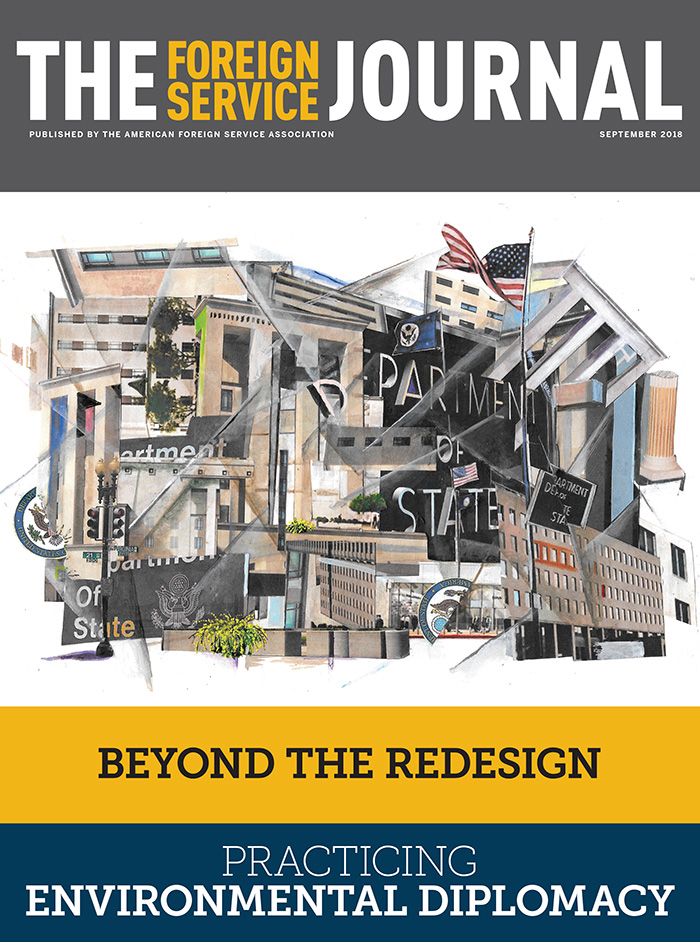
Individuals who question how they fit into a diverse workplace should remember that the value of diversity is not in an individual’s race, gender or ethnicity; it is in the experiences and insights that those attributes often bring. Diversity may refer to innate characteristics, but it can also be acquired. All of us bring unique life experiences to our work, and employees who focus on their lack of physical manifestations of diversity will miss valuable opportunities to contribute to a diverse team.
I appreciate that my current office leadership prioritized recruiting a diverse team. When we gather for staff meetings, we have a mix of backgrounds, races, genders and ethnicities. With fewer people at the table like me, I feel like my opinion has more value. Conversations include a rich variety of perspectives.
When I share my thoughts, I must reflect and provide support for my positions. This doesn’t just provide our team with a broader range of ideas; it forces individuals to ensure their proposals are well thought out before they bring them to the group. In other words, I have to think harder and communicate better in a diverse environment. Diversity makes me a better officer and diplomat.
—Jay Porter, September 2018
Ebenezer Bassett: The Legacy of America’s First African-American Diplomat

Just days after the Battle of Gettysburg, Bassett and other black leaders organized a recruiting drive for black soldiers. Bassett had the honor of being the second speaker of the night, making his speech immediately preceding [Frederick] Douglass. The following excerpt explains why he, too, was considered such an effective orator:
“Men of color, to arms! Now or never! This is our golden moment. The government of the United States calls for every able-bodied colored man to enter the army for three years of service and join in fighting the battles of liberty and the Union. A new era is open to us. For generations we have suffered under the horrors of slavery, outrage and wrong; our manhood has been denied, our citizenship blotted out, our souls seared and burned, our spirits cowed and crushed, and the hopes of the future of our race involved in doubts and darkness.
“But how the whole aspect of our relations to the white race is changed! Now, therefore, is the most precious moment. Let us rush to arms! Fail now, and our race is doomed on this soul of our birth.”
That activism proved crucial years later when General Ulysses Grant won the White House in 1868. The new president was eager to reward leaders in the black community like Bassett who had helped preserve the Union.
—Chris Teal, June 2018
Diversity in Diplomacy: The Mentoring Dimension
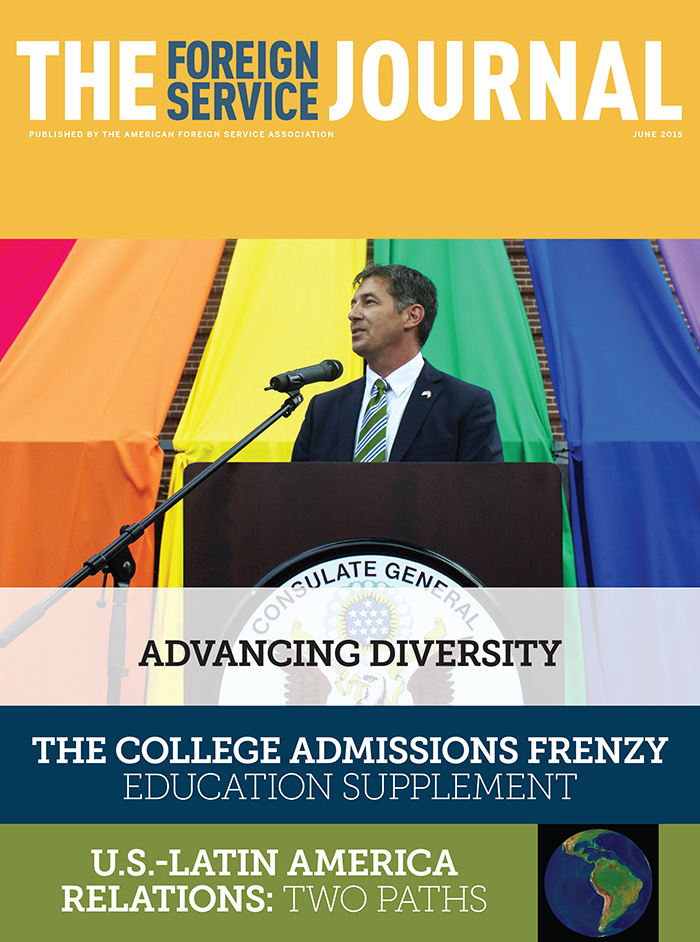
The different perspectives that come from embracing diversity can give the United States a kind of asymmetric advantage—the challenge is to leverage that advantage.
It is no secret that the Foreign Service needs more diversity. According to the 2014 promotion statistics, gender and racial disparity persists in promotions and the gaps widen at the Senior Foreign Service level. …
We believe that a robust mentorship program is vital to achieving and sustaining greater diversity in the Foreign Service. The State Department’s advancements in recruiting minorities and ensuring equity across the diversity spectrum should be expanded to sustain diversity into the senior ranks.
—Jennifer Zimdahl Galt and Thao Anh Tran, June 2015
Hispanic Representation at USAID: Why So Low for So Long?
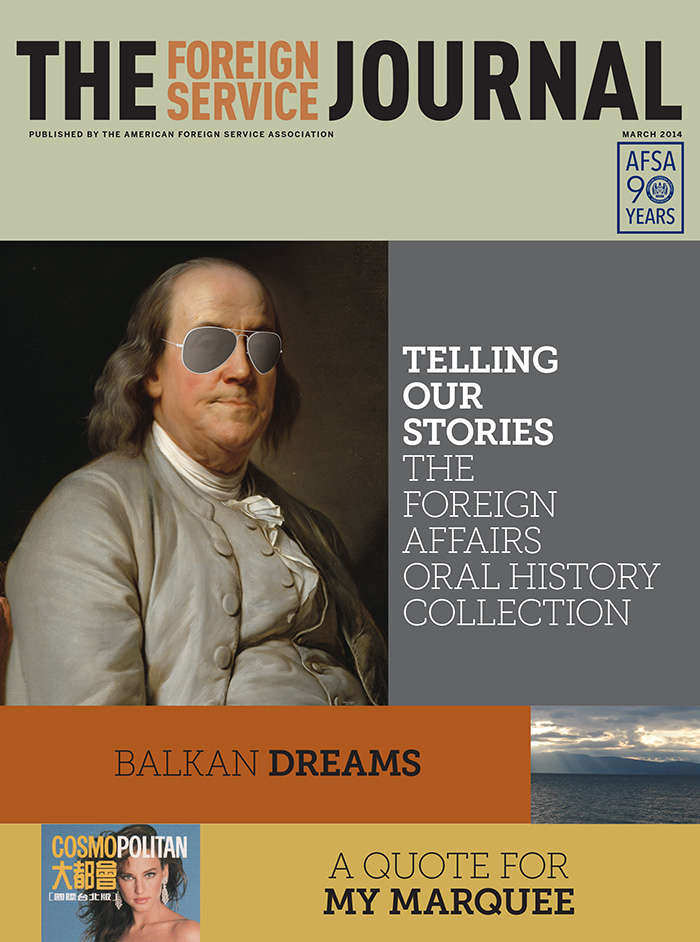
Periodically, I am asked to speak to Hispanic and minority students aspiring to enter the Foreign Service or the U.S. Agency for International Development. I can hardly resist the chance to tell my own life story and describe the places where USAID has sent me. The Foreign Service is a great career, I tell them, and I encourage them to consider taking the plunge.
One reason I’m tapped to give these speeches is that I’m a 25-year veteran of the Foreign Service, and also a member of an endangered species: mid-level Hispanic FSOs. My agency is sincerely trying to recruit a more diverse workforce, but has consistently failed in terms of Hispanic representation since the late 1970s, when data on ethnicity began to be collected.
A great deal of energy has gone into better recruitment, and those efforts should continue and be expanded. …
But that needs to be accompanied by a broader effort—not only on behalf of Hispanics, but to benefit everyone at USAID—to cultivate a diverse Senior Management Group cadre. … If a qualified Hispanic (or other minority) has applied for an SMG position, there must be a compelling reason not to select that candidate. “I like this person more” is just not acceptable.
—José Garzón, March 2014
TLG: Expanding Opportunities at State
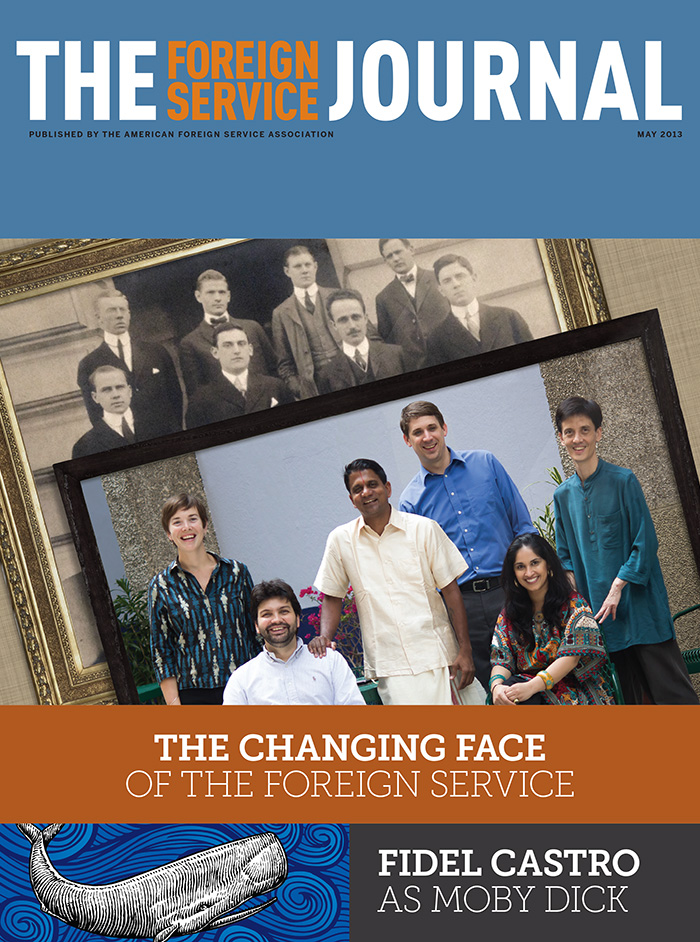
In 1973 William B. Davis and Roburt Dumas, African-American employees of the U.S. Information Agency, became interested in identifying career paths for the advancement of African-American employees of USIA, State and other foreign affairs agencies. The duo organized meetings over lunch with like-minded African-American officers on the first Thursday of each month, inspiring Davis to dub the organization the “Thursday Luncheon Group.”
TLG, as the group is usually referred to, quickly began to focus on outreach to senior State Department officials, with the goal of advancing long-term personnel and management goals. …
Today, the informal mentoring program Davis and Dumas launched four decades ago has grown into a robust organization, comprising more than 300 active-duty Foreign Service officers and Civil Service employees, associate members and retired employees of the Department of State and the U.S. Agency for International Development. It is also the oldest of the 12 State Department employee affinity groups recognized by the Office of Civil Rights.
—Stacy D. Williams, May 2013
The Issue of Race, Ethnicity
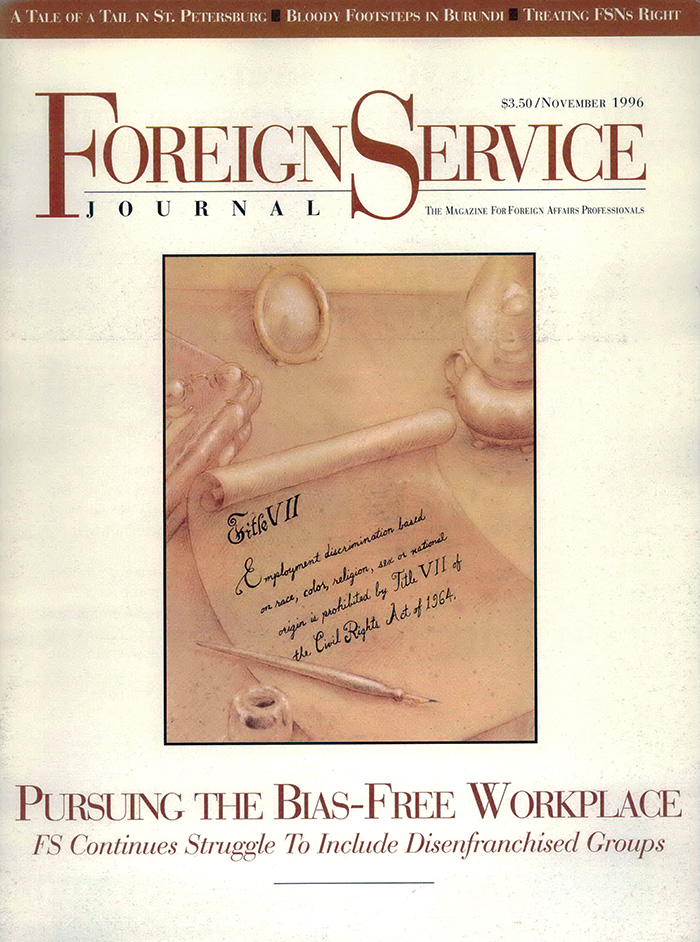
Neither blacks nor other minorities made much headway in the Service until the U.S. civil rights movement swept the country in the mid-1960s. When that decade opened, only 17 of 3,732 FSOs were black. …
The year 1964 was a turning point for blacks in the Foreign Service, culminating in the passage of the Civil Rights Act and a revised Foreign Service Act. A flurry of programs to recruit minorities into the Foreign Service would follow.
President Jimmy Carter, backed by Secretary of State Cyrus Vance, was credited with increasing the number of black political appointees as ambassadors between 1977 and 1981. …
During this period, [Terrence] Todman himself was named ambassador to Spain. Carter’s appointment of Andrew Young as U.S. ambassador to the United Nations, the first time a black had been named to such a high-profile policymaking level in U.S. government, became an important milestone for minorities as well. During the Reagan administration, 11 black career diplomats were named as ambassadors. Fewer black ambassadors were appointed in the Bush administration, although black appointees fared better during Clinton’s first four years.
—Francine Modderno, November 1996
The Case for Racial Diversity in the Foreign Service
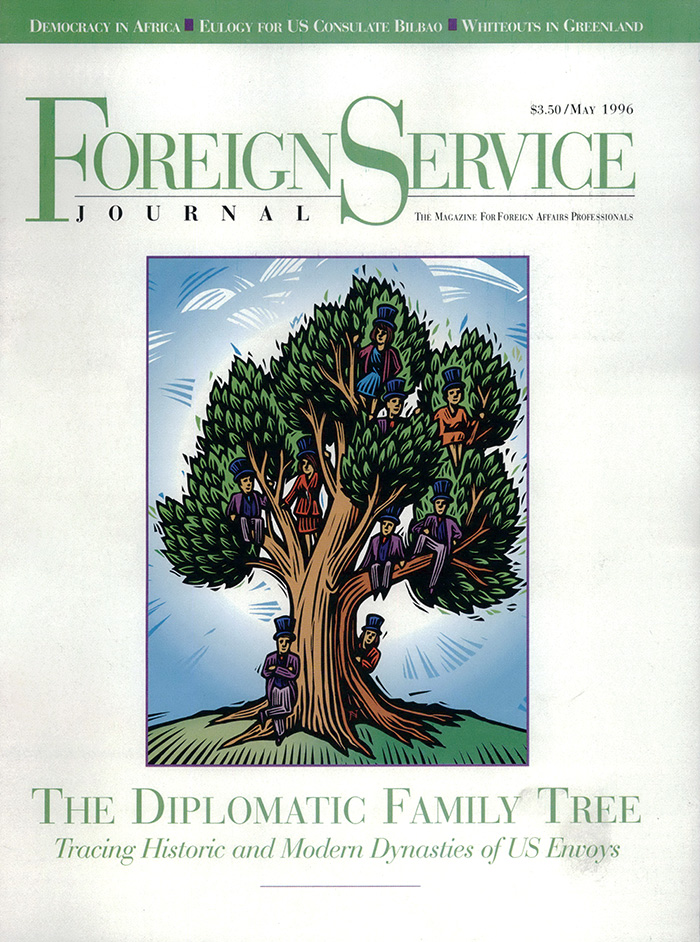
Diversity in America’s diplomatic service received its first official endorsement in the 1960s. Concerned with America’s image abroad, when the Soviet Union was competing with the United States in the Third World, President John Kennedy and Secretary of State Dean Rusk decided to increase the number of blacks in America’s diplomatic corps. … But there are stronger reasons than cosmetic for promoting diversity in America’s diplomatic corps. …
Professionals of the foreign affairs community often complain that the Foreign Service and the State Department—unlike the agencies of Defense and Agriculture—do not have powerful constituencies in American society and in Congress. This handicap, which becomes especially painful when Congress takes up the foreign affairs budget, exists partially because many Americans, including some members of Congress, view the Foreign Service as elitist and irrelevant to the interests of the common person.
This unflattering impression of the Foreign Service would change and the State Department would find it easier to earn badly needed congressional support if the Foreign Service reflected the diverse communities throughout the country and made fuller use of all members of the American family.
—Kenneth Longmyer, May 1996
Building a Representative Foreign Service
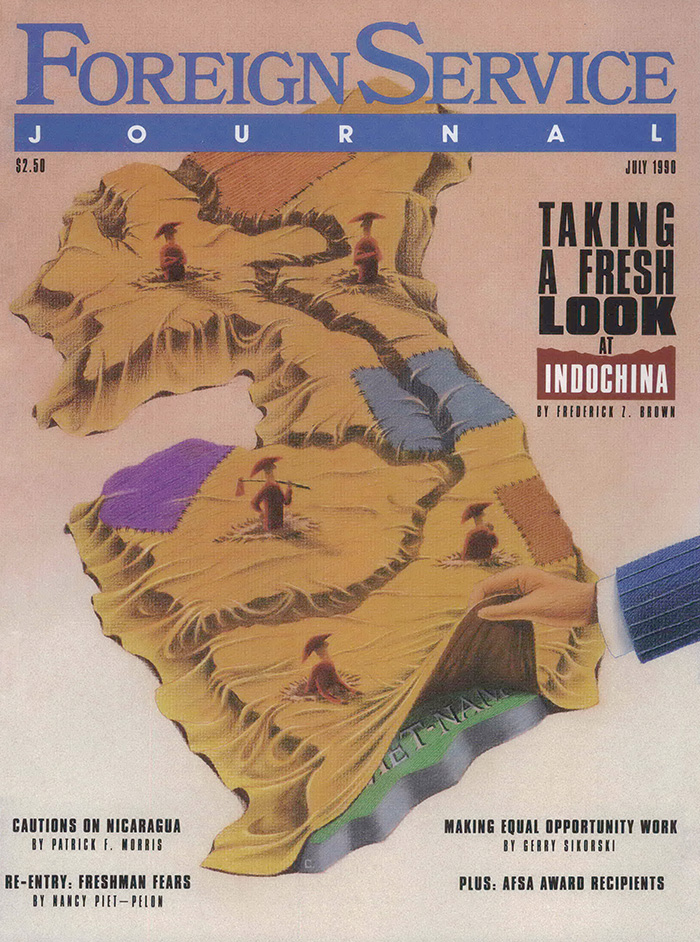
The Foreign Service Act of 1980 reorganized the Foreign Service, emphasizing that the Foreign Service should be representative of the American people. Specifically, the legislation aimed at strengthening the Foreign Service by promoting policies and procedures—including affirmative action—that would encourage entry and advancement in the Foreign Service by people from all segments of American society, as well as promoting fair and equitable treatment for all without regard to political affiliation, race, color, religion, national origin, sex, marital status, age or handicap.
The Senior Foreign Service may be the last bastion of discrimination in the Foreign Service. I respect and admire those who have worked their way to the top and survived the rigorous training and hardships. However, I am discouraged by inequality in a system that appears to stack the deck in favor of a select few. …
Congress can and will pass legislation and hold oversight hearings, but it is up to the officials at the State Department to carry out policies of equal opportunity and equal representation. Reports and studies can identify the problems, but the solutions can come only from action.
—Congressman Gerry Sikorski (DFL Party, Minn.), July 1990
The Status of Women
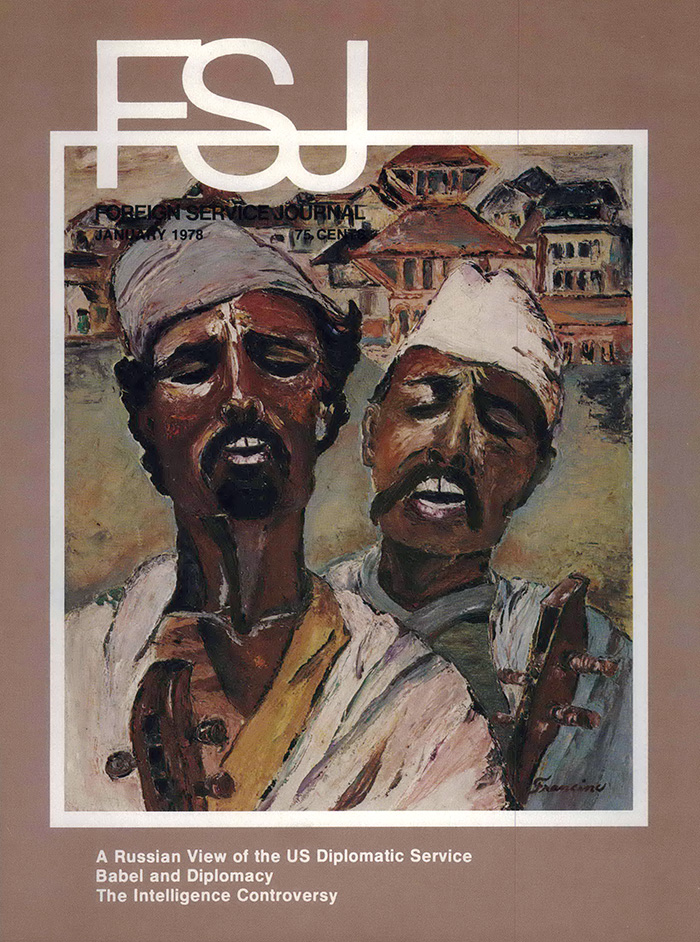
I believe the real test of equality is the extent to which a woman is expected to carry her full share of the workload and is actively supported in doing so. I wonder how many other women have had written into their efficiency report that Ms. Jones is a capable officer, but unfortunately the work she was assigned to do did not justify a recommendation for promotion. Whose failure was that?
If a supervisor really wants to get the most out of a woman assigned to the mission—and I suspect some secretly see themselves as martyrs doomed to carry an extra burden for the sake of women’s lib—perhaps he should ask himself a few soul-searching questions:
Do you assign a woman officer the same workload, both in substance and volume, that you would assign a male officer of the same grade and experience?
Do you find yourself looking around for jobs “suitable for women”?
Do you try to “help her out” by taking over the more challenging assignments, rather than letting her take what comes? …
The questions above are not hypothetical. They derive from actual situations in which I have found myself on one occasion or another. I believe the real loser, in the last analysis, was the United States Government, which was not getting the full benefit of the talents it was paying for.
—Ms. Jones, January 1978
Beyond the Call of Duty
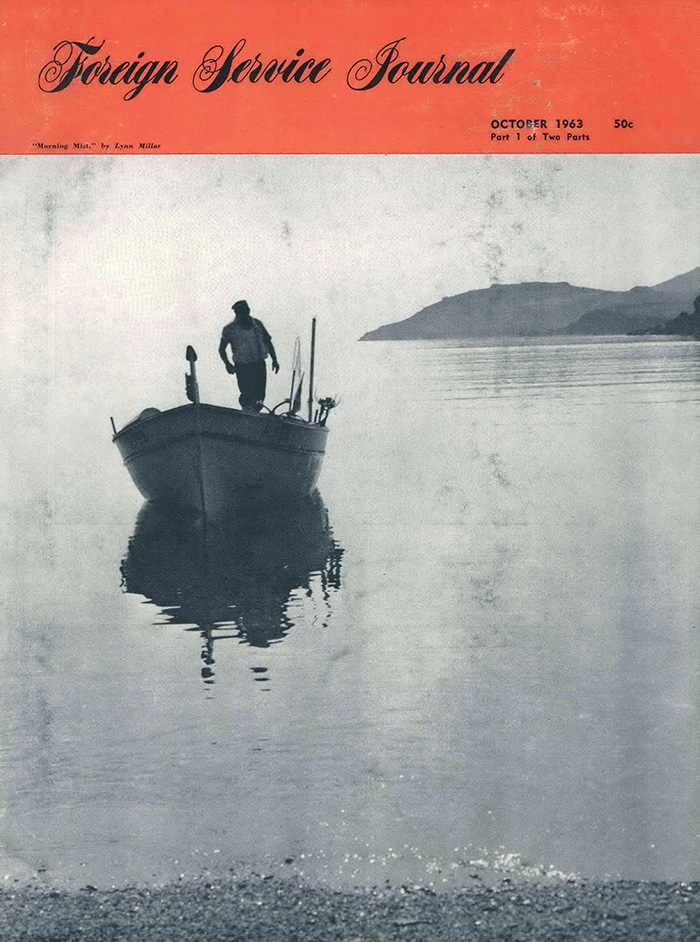
It isn’t often that we get an opportunity to submit a performance rating on the Secretary of State. But there was a quality about Secretary Rusk’s recent testimony on civil rights [legislation that became the Civil Rights Act of 1964] before the Senate Committee on Commerce which came through clearly in the television reportage and which we thought it well to impart to our readers, especially those overseas, who were not within camera range.
It was certainly within the scope of the Secretary’s responsibilities to point out that the failure of the United States to live up in practice to what it preaches in its Constitution and Declaration of Independence is exploited by the communists in their attempts to belittle the U. S. claim to leadership of the Free World. It was also most appropriate for the Secretary to reveal how difficult it is to carry on correct diplomatic relations with representatives of other countries whose color subjects them to the kind of discrimination and injury to their personal dignity which some people in this country still practice toward more than ten percent of the United States citizenry. …
Then, quite deliberately, he committed the Department and the Foreign Service in the following passage: “So, let me stress again, the interest of the Department of State in this bill reaches far beyond obtaining decent treatment for non-white diplomats and visitors. We are directly and comprehensively concerned with obtaining decent treatment for all human beings, including American citizens.” …
This attitude goes to the heart of the problem. Despite the decisions of the courts, the decrees of the Executive Branch, and even eventual laws by Congress, the only permanent solution to this issue lies in the attitude of the individual to his fellow man. All of us in the Service who deal constantly and intimately with people of all races and colors might well think of these things.
—Editorial, October 1963


